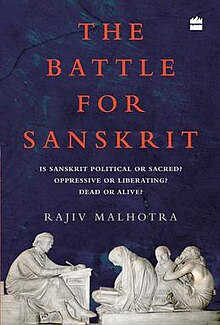The Battle for Sanskrit

Cover of the book The Battle for Sanskrit
|
|
| Author | Rajiv Malhotra |
|---|---|
| Country | India |
| Language | English |
| Subject | Sheldon Pollock |
| Publisher | Harper Collins India |
|
Publication date
|
2016 |
| Pages | 488 |
| ISBN | |
| Website | http://thebattleforsanskrit.com |
The Battle for Sanskrit: Is Sanskrit Political or Sacred, Oppressive or Liberating, Dead or Alive? is a 2016 book written by Rajiv Malhotra which warns against the post-orientalist American indologist Sheldon Pollock. Malhotra pleads for traditional Indian scholars to write responses to Pollock's views.
Rajiv Malhotra explains why he wrote this book. He notes the hegemony of western approaches in studying India, and asks for a study of this western approach from a traditional point of view. His book is an attempt to provide such a reversal.
According to Malhotra, western Indology scholars are deliberately intervening in Indian societies by offering analyses of Sanskrit texts which would be rejected by "the traditional Indian experts." He also finds western scholars too prescriptive, that is, being "political activists" that want to prescribe a specific way of life.
The inducement for this book was the prospect of Sringeri Peetham, the monastery founded by Adi Shankara in south India, collaborating with Columbia University to set up an "Adi Shankara Chair" for Hindu religion and philosophy, sponsored by an Indian donor. The instalment committee for the Chair was to be headed by Sheldon Pollock, whom Malhotra regards as an erudite scholar but also as one who undermines the traditional understanding. Malhotra contacted the lead donor to voice his concerns, which were not shared by the donor. Nevertheless, Malhotra fears "the issue of potential conflict when the occupant of the chair takes positions that undermine the very tradition that has backed and funded the chair." According to Malhotra,
... the Vedic traditions are under assault from a school of thought whose fundamental assumptions are dismissive of the sacred dimension. If, out of naivety, we hand over the keys to our institutions and allow outsiders to represent our legacy, then any chance of genuine dialogue will be lost. Furthermore, because of the enormous prestige and power of Western universities, a view of the Sanskrit will become accepted by the public.
According to Malhotra, Sanskrit forms the essence of Indian civilisation. Malhotra discerns an "insider" and an "outsider" approach to the study of Sanskrit texts based on the academic concept of Emic and etic. However Malhotra emphasizes his distinction between insiders and outsiders is not based on ethnicity, but the lens through which one looks at Sanskrit texts. Insiders view Sanskrit as sacred, but outsiders view the sacredness of Sanskrit as merely a smokescreen for oppressive views.
...
Wikipedia
